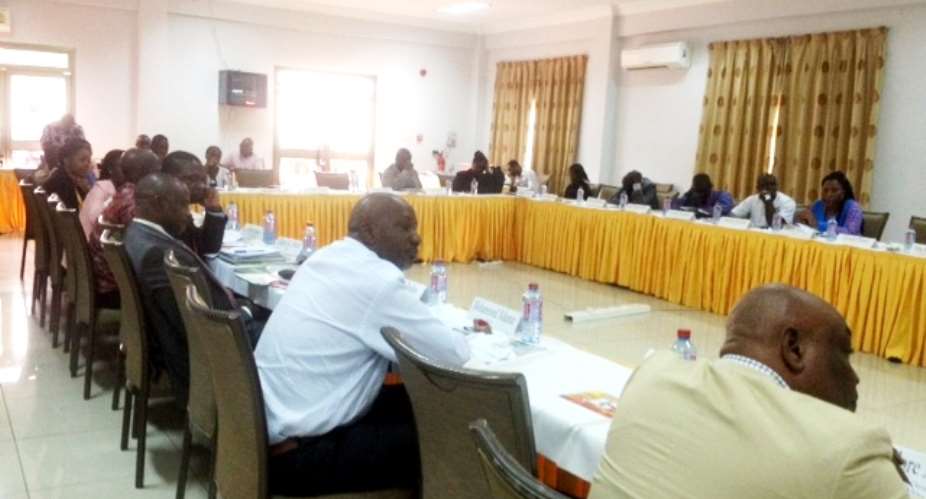With the year 2016 fast approaching, players in the drug sector including non-governmental organizations, stakeholders, civil society organizations, governmental organizations, and public health workers are holding series of meetings to ensure that no stone is left unturned in working to meet the United Nation’s General Assembly’s Special Session (UNGASS) 2016 view on drug policy formation.
It is in this vein that the West Africa Civil Society Institute (WACSI) in partnership with the Open Society Initiative for West Africa (OSIWA), have organized a 2-day multi-sectoral meeting on drug policy reform to brainstorm on how best West African countries can seize the opportunity offered by the UNGASS World Drug Problem to evaluate and adjust existing drug policies to ensure that they respond to national and region realities.
The 2-day meeting was dubbed: The Road to UNGASS 2016, and was started on Tuesday October 27, and expected to end on Wednesday October 28.
In an address, the Executive Director of WACSI, Nana Asantewa Afadzinu, the meeting was a crucial one which aims at assessing current drug policies and the impact of the international conventions on national drug policies; while interrogating the measures put in place at the national levels to deal with drug trafficking, production and consumption.
She said the two-day meeting will also identify and highlight best practices in tackling drugs, security and organised crime at country levels, and to foster collaboration among key government and civil society in the fight against drug trafficking in the West Africa sub-region.
Nana Afadzinu quoted a famous quote by Kofi Annan on drug policy, and she lamented on the rate at which bad drug policy is having a toll on the socio-economic development on West African countries.
“We are not unaware of the socio-economic problems that drug causes. But how are we dealing with the drug issues in terms of policies and the treatment meted out to people who are caught using drugs. Are they treated like the traffickers who are making the money?” Nana lamented.
She advocated that the current drug policy in which drug users are criminalized must be checked and rather, drug abuse must be considered as a public health concern.
The WACSI Executive Director said government must channel resources in providing health centres and rehabilitation places to cater for drug users, as a better option over the resources used in building more prisons to house drug users.
The prisons, she said, does not transform the drug abusers but rather make their condition worse when they come out, and added that over avenues like the prayer camp offer no help in transforming drug users.
Nana Asantewa Afadzinu urged all the participants to make their voices heard.
Mr. Lasana Gberie, a United Nation official working in the drug sector said the multi sectoral meeting on drug policy reform was being held at the right time when stakeholders in the sector could take advantage of the upcoming UNGASS World Drug Problem to advocate better drug policies for West Africa countries.
Mr. Gberie said West Africa has not only become a transit point to European countries but also a drug producing and consumption hub; with the prevalence rate of cannabis use in West and Central Africa at 12.4%.
According to an assessment conducted by the United Nations Office on Drug and Crime, the 12.4% rate is higher than Africa’ 7.5% and the global average of 3.9%.
He said drug money gets into the banks and every aspect of the economies of the countries and can influence corruption.






 April 23: Cedi sells at GHS13.66 to $1, GHS13.07 on BoG interbank
April 23: Cedi sells at GHS13.66 to $1, GHS13.07 on BoG interbank
 GRA clarifies tax status of resident individuals earning income abroad
GRA clarifies tax status of resident individuals earning income abroad
 2024 elections: NDC to officially unveil Jane Opoku-Agyemang as running mate tom...
2024 elections: NDC to officially unveil Jane Opoku-Agyemang as running mate tom...
 Bawumia embarks on working visit to Italy and the Vatican to boost bilateral tie...
Bawumia embarks on working visit to Italy and the Vatican to boost bilateral tie...
 Senegal's new leader calls for a rethink of the country's relationship with the ...
Senegal's new leader calls for a rethink of the country's relationship with the ...
 Chairman Kingsley Owusu Brobbey calls for Privatization of Electricity
Chairman Kingsley Owusu Brobbey calls for Privatization of Electricity
 Gov't to consolidate cash waterfall revenue collection accounts
Gov't to consolidate cash waterfall revenue collection accounts
 Gov't to settle lump sum for retired teachers by April 27
Gov't to settle lump sum for retired teachers by April 27
 Former PPA CEO granted GH₵4million bail
Former PPA CEO granted GH₵4million bail
 NPP trying to bribe us but we‘ll not trade our integrity on the altar of corrupt...
NPP trying to bribe us but we‘ll not trade our integrity on the altar of corrupt...
